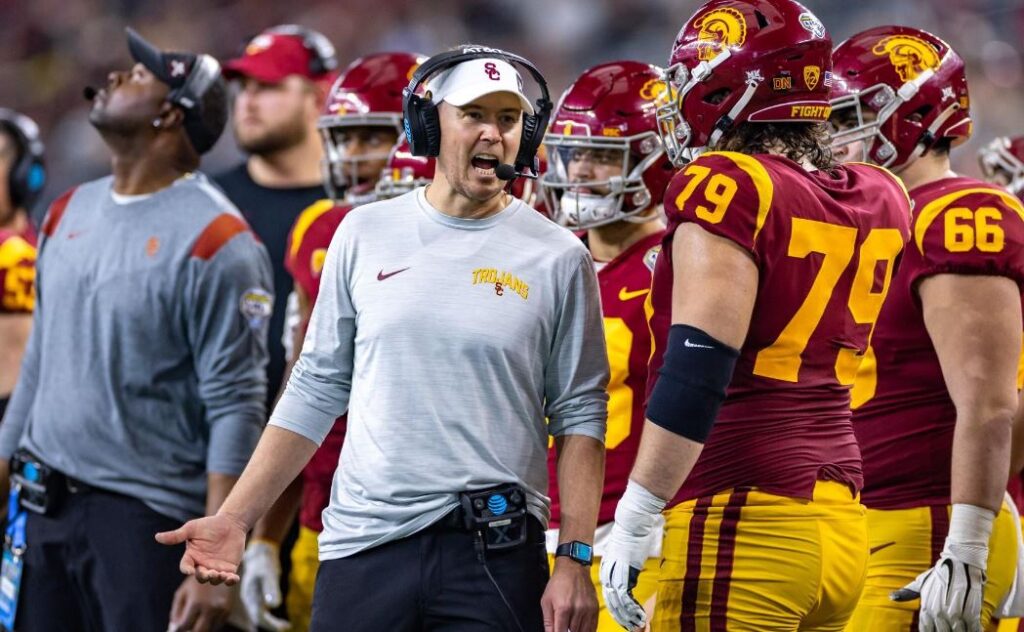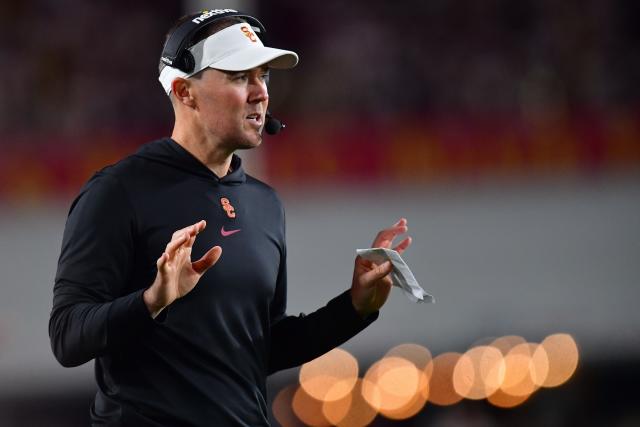
The greatest intersectional rivalry in college sports recently received a two-fer, due to one of its own.
Lincoln Riley, USC’s coach, was the first to confront the unfathomable. When questioned about the future of the Trojans’ legendary rivalry with Notre Dame, Riley told reporters at Big Ten football media days, “There’s been a lot of teams that sacrifice rivalry games.”
A week later, athletic director Jen Cohen attempted to backtrack on Riley’s statements, but not completely. “Things are changing,” Cohen told ESPN710. “But tradition is also part of doing what’s best. So we’ll try our best to respect that and grow in this space.”
What is going on with Anthony Davis and the Bush Push?
Will USC genuinely terminate a series that has lasted 98 years, produced 14 Heisman Trophy winners, and created innumerable memories?
A series that accounts for a major percentage of USC’s media value and national visibility?
A series that pleases so many contributors and season ticket holders?
In a day where USC shares a conference with Wisconsin and institutions share revenue with athletes, anything is imaginable, including the termination of a sport-defining rivalry.
The issue is front and front now as the Trojans prepare for their first season in the Big Ten, with a head coach under pressure to produce and a schedule ready to attack.
In addition to Michigan, Penn State, Wisconsin, and Washington, the Trojans open the season with LSU in Las Vegas and finish with the Irish at the Coliseum.
That’s similar to the trash compactor scene in Star Wars, with the walls closing in and the monster below the surface.
By every measure, USC’s schedule is among the most difficult in the country.

Fortunately for the Trojans, they will not have to decide whether to renew the Notre Dame series when the present deal expires at the end of the 2025 season. The College Football Playoff Selection Committee will make that decision for them.
Of course, the committee does not have direct scheduling control.
However, it serves as both judge and jury in the process of selecting the seven at-large teams and 12 seeding for the expanded event, which begins this season.
Anyone involved with nonconference schedules throughout the Power Four, particularly head coaches and athletic directors, will be monitoring the committee for clues and yearning for guidance.
During the original CFP format’s ten-year run, the committee never invited a team with two losses. Will it continue to lean towards the overall record?
Or will the committee place a greater focus on strength of schedule (SOS) than in the past, both in terms of team selection and seeding?
Will the committee select three-loss teams above two-loss teams? Will it put two-loss teams ahead of one-loss ones?
For the sake of the sport, we hope SOS is not absent from the proceedings.
The committee should communicate to the Trojans, Irish, and everyone else that it prefers nonconference schedules that include at least one A-level opponent.
It’s worth mentioning that Michigan athletic director Warde Manuel will lead the committee in 2024; his team will visit Texas on September 7 in one of the season’s most anticipated games.
Ideally, Manuel and his staff will favor the A-B-C strategy to nonconference scheduling, in which clubs play one Power Four opponent and one each from the Group of Five and the FCS.
Heck, an A-C-C system would be acceptable in the sport’s new era.
The marquee matches attract attention and intrigue in the first half of September, before conference play begins, and help establish the conference hierarchy.
They have great media significance as well.
It’s impossible to conceive that NBC, which co-owns the Big Ten with Fox and CBS and is the exclusive broadcaster of Notre Dame home games, would approve of USC’s decision to stop its series with the Irish.
However, if the committee prioritizes overall record over schedule strength in the seeding and at-large selection process, the Trojans would be completely justified in reevaluating the Notre Dame series’ potential.
Why would Michigan agree to play another series with Texas?
Why would Alabama and Ohio State persist with their planned series in 2027-28?
Qualifying for the extended CFP must be prioritized.
“As we get into this playoff structure and if it changes or not,” Riley said during the Big Ten’s media conference, “we’re going to learn some about this as we go and what the right and best track is to winning a national championship.”
The committee’s message will determine the future of nonconference scheduling across the Power Four.
Let’s hope it sends the correct one.






